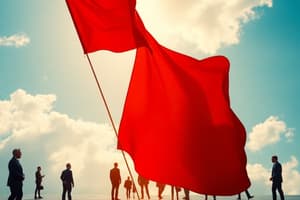Podcast
Questions and Answers
What are institutions according to North (1990)?
What are institutions according to North (1990)?
- A set of rules, social and political constructions, and interactions of actors (correct)
- Informal constraints that reinforce formal rules
- Values, morals, ethics, and beliefs that are not codified
- The rules of the game codified in contracts and constitutions
Which best describes informal institutions?
Which best describes informal institutions?
- Are static and neutral
- Reinforce formal institutions (correct)
- Are codified in handbooks and constitutions
- Depend solely on individual interactions
What do institutions require to form agreed and predictable rules?
What do institutions require to form agreed and predictable rules?
- Lack of change
- Repeated interactions (correct)
- Formal codification only
- Individual behaviors
According to Leftwich & Sen (2011), institutions depend on:
According to Leftwich & Sen (2011), institutions depend on:
What role do organizations play in relation to institutions?
What role do organizations play in relation to institutions?
How are organizations defined in the text?
How are organizations defined in the text?
"Institutions have the capacity to self-reinforce and self-perpetuate". What does this mean?
"Institutions have the capacity to self-reinforce and self-perpetuate". What does this mean?
"Institutions are neither static nor neutral; always changing yet durable." What does this imply?
"Institutions are neither static nor neutral; always changing yet durable." What does this imply?
"Formal: tariffs | Informal: class rules" is an example related to which type of institutions?
"Formal: tariffs | Informal: class rules" is an example related to which type of institutions?
"Formal: divorce law | Informal: religion" is classified under which type of institutions?
"Formal: divorce law | Informal: religion" is classified under which type of institutions?
Flashcards are hidden until you start studying
Study Notes
Constructivism in Politics
- Focus on formal institutions and organizations
- Emergence of ideational turn in politics in the 1970s
Norms and International Relations
- Constructivism: ideational factors shape international relations, not just material factors
- A shared reality is created through interaction and knowledge
- Norms: standards of appropriate behavior for actors with a given identity
- Categories of norms: regulative, constitutive, and prescriptive
Development Stages of Norms
- Stage 1: Norm Emergence
- Started by norm entrepreneurs through persuasion and issue-framing
- Society must understand and believe in the new norm
- Stage 2: Normative Contestation
- Resistance to a given international norm
- Critical engagement that affects political outcomes
- Stage 3: Norm Cascade
- Norm entrepreneurs vs. norm leaders
- Norm followers join due to legitimacy, reputation, esteem, etc.
- Cascading through socialization, institutionalization, and demonstration
- Stage 4: Norm Internalization
- Norms become taken for granted and integral to living
- Thoughtless compliance
Women's Suffrage as an Example
- Norm Entrepreneur: suffragettes and organizations for women's voting rights
- Norm Emergence: women should have the same rights as men
- Tipping Point: rallies and lobbying legislators, and plebiscite in 1937
- Norm Cascade: debates among political circles and arguments with politicians
- Norm Internalization: succeeding constitutions have equal voting rights for women and men
Institutions
- Institutions are the rules of the game
- Consist of both informal constraints and formal rules
- Informal institutions reinforce formal institutions
- Classifications: economic, political, and social institutions
- Formal institutions: codified, e.g., contracts, handbooks, constitutions
- Informal institutions: not codified, e.g., values, morals, ethics, beliefs
Characteristics of Institutions
- Require repeated interactions to form agreed and predictable rules
- Have the capacity to self-reinforce and self-perpetuate
- Depend on individuals, their interactions, and patterns of thought
- Are neither static nor neutral; always changing yet durable
Organizations
- Formally or informally coordinated vehicles for promoting and protecting individual and shared interests and ideas
- If institutions are the rules of the game, then organizations are the players
- Organizations are crucial to institutional change
Studying That Suits You
Use AI to generate personalized quizzes and flashcards to suit your learning preferences.



